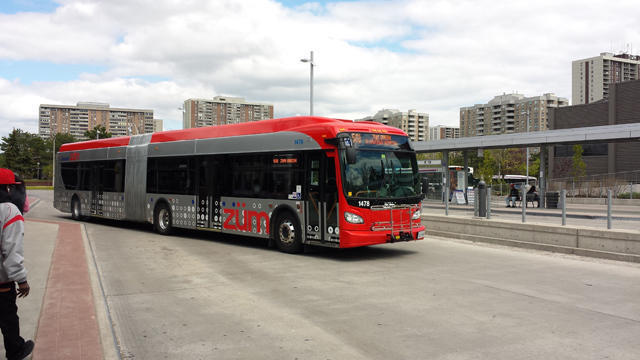Ontario’s First Electric Buses Are Coming to Brampton
Published April 17, 2018 at 7:57 pm

Brampton Transit is seeing unprecedented increases in ridership and continues to be one of the fastest growing transit systems across the country.
Brampton Transit is seeing unprecedented increases in ridership and continues to be one of the fastest growing transit systems across the country. Now, the province has announced funding for a pilot project that will bring electric buses to Brampton – for the first time in Ontario.
It’s true, the province recently announced that it’s funding a new pilot project to test electric battery-powered buses in Brampton and York Region.
The first electric buses in Canada were deployed in Vancouver, B.C. as part of the same project. Brampton City Council actually approved the purchase of several electric buses for this project in early 2017.
Brampton Transit was also the lead transit agency in planning and executing this trial since 2015, in partnership with the Canadian Urban Transit Research and Innovation Consortium (CUTRIC).
The new vehicles that hit the roads in Vancouver are called the New Flyer Xcelsior CHARGE. The batteries on these buses can recharge within four to seven minutes, according to TransLink.
“By 2019, Brampton will have the single largest global deployment of standardized and fully interoperable battery electric buses and high powered overhead on-route charging systems; with eight electric buses (six by New Flyer Industries, and two by Nova Bus) and four charging systems (three by ABB Group and one by Siemens),” reads a recent release from the city.
Ultimately, the new electric buses aim to reduce the city’s carbon footprint and greenhouse gas emissions.
“As Brampton sits along Canada’s Innovation Super Corridor, our well-connected transit network and a sustainable fleet is important in moving people more effectively across the GTHA,” said Mayor Linda Jeffrey.
Right now, Brampton Transit operates 422 buses, 110 of which are Zum buses, which are diesel-hybrid electric and reduce some 3,500 tonnes of GHG per year when compared to full diesel, according to the city.
The fleet is expected to surpass 800 vehicles by 2031.
The value of this project? A whopping $40 million from the federal government, and total capital costs for the project are anticipated to reach about $13.6 million in Brampton.









